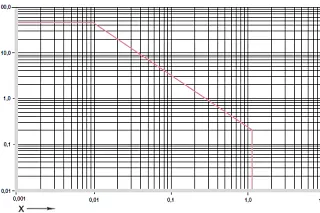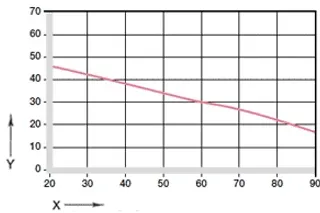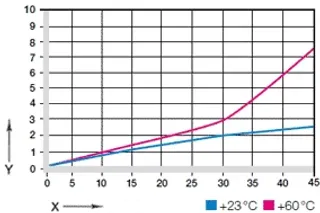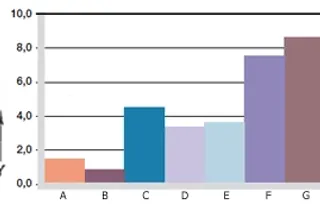Verander van taal :
iglidur® J2 - Materiaalgegevens
Materiaal tabel
Algemene specificatie
Eenheid
iglidur® J2
Testmethode
dichtheid
g/cm³
1,44
Kleur
lichtgeel
max. Vochtabsorptie bij 23°C/50% kamervochtigheid.
Gewicht
0,2
DIN 53495
max. totale vochtopname
gewichtsprocent
1,3
Schuifwrijvingscoëfficiënt, dynamisch, tegen staal
µ
0,11 - 0,27
pv-waarde, max. (droog)
MPa x m/s
0,23
Mechanische specificatie
buigmodulus
MPa
3.605
DIN 53457
buigsterkte bij 20°C
MPa
101
DIN 53452
Samendruksterkte
MPa
77
maximaal aanbevolen oppervlaktedruk (20°C)
MPa
46
Shore D hardheid
n.b.
DIN 53505
Fysische en thermische specificatie
Bovenste langetermijntoepassingstemperatuur
°C
+90
bovenste kortstondige toepassingstemperatuur
°C
+110
Lagere toepassingstemperatuur
°C
-50
warmtegeleidingsvermogen
[W/m x K]
0,25
ASTM C 177
thermische uitzettingscoëfficiënt (bij 23°C)
[K-1 x 10-5]
7
DIN 53752
Elektrische specificatie
Volumeweerstand
Ωcm
> 1013
DIN IEC 93
oppervlakteweerstand
Ω
> 1012
DIN 53482
Tabel 01: Materiaalgegevens

diagram. 01: Toelaatbare pv-waarde voor iglidur® J2 glijlagers met een wanddikte van 1 mm in droog bedrijf tegen een stalen as, bij +20 °C, geïnstalleerd in een stalen behuizing
X = oppervlaktesnelheid [m/s]
Y = belasting [MPa]
iglidur® J2 is rechtstreeks vergelijkbaar met onze klassieke iglidur® J wat betreft de algemene mechanische en thermische specificatie. iglidur® J2 is echter superieur aan iglidur® J op het vlak van mechanische specificaties, zoals de maximaal aanbevolen oppervlaktedruk. De slijtvastheid bij droog gebruik is echter inferieur.

diagram. 02: aanbevolen maximale oppervlaktedruk als functie van de temperatuur (46 MPa bij +20 °C)
X = temperatuur [°C]
Y = belasting [MPa]
Mechanische specificatie
De druksterkte van iglidur® J2 glijlagers neemt af bij stijgende temperaturen. diagram. 02 illustreert deze correlatie. De maximaal aanbevolen oppervlaktedruk is een mechanische materiaalparameter. Hieruit kunnen geen conclusies over de tribologie worden getrokken.

Diagram 03: Vervorming onder druk en temperatuur
X = Belasting [MPa]
Y = vervorming [%]
diagram. 03 toont de elastische vervorming van iglidur® J2 onder radiale belasting. De mogelijke plastische vervorming hangt onder andere af van de duur van de belasting.

diagram. 06: Slijtage, roterende toepassing met subdl. asmaterialen, p = 1MPa, v = 0,3m/s
X = asmateriaal
Y = slijtage [μm/km]
A = aluminium, hard geanodiseerd
B = vrij snijdend staal
C = Cf53
D = Cf53, hard verchroomd
E = HR koolstofstaal
F = 304 SS
G = hoogwaardig staal
Asmaterialen
Wrijving en slijtage zijn ook sterk afhankelijk van de partner. Te gladde assen verhogen zowel de wrijvingscoëfficiënt als de slijtage van het lager. diagram. 06 toont een uitbreiding van de resultaten van tests met verschillende asmaterialen. In diagram. 06 is te zien dat iglidur® J2 goede slijtagewaarden levert bij rotatie bij 1 MPa, vooral bij vrij snijdend staal. In droogloop zijn de slijtagewaarden op andere asmaterialen in sommige gevallen aanzienlijk hoger.
In tegenstelling tot veel andere iglidur®materialen is de slijtage bij zwenken iets hoger in vergelijking met rotatie bij verder identieke parameters (diagram 07).
Contact
Ik beantwoord uw vragen graag persoonlijk!

igus® B.V.+31(0)346 353 932Verstuur een e-mail
Klantenservice en verkoop
Bereikbaarheid: Maandag t/m vrijdag: 8:00 - 17:00 uur
Webshop: 24/7
Chat-service: Maandag t/m vrijdag 8:00 - 17:00 uur



